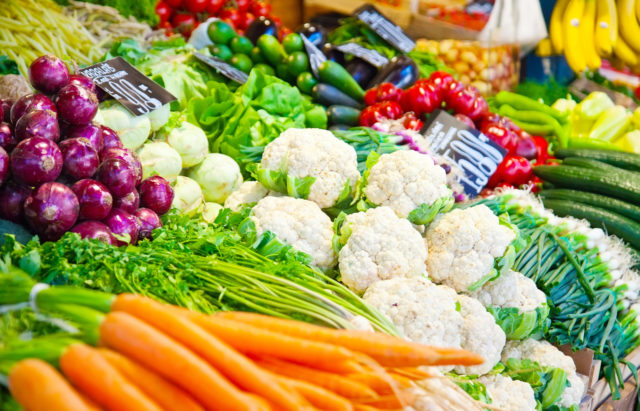Eating a good amount of vegetables each day is important.
They are not only nutritious, but may also offer protection against various diseases, including diabetes, obesity, heart disease and even certain types of cancers.
Most people suggest that the more vegetables you eat, the better. However, research shows that this may not always be the case. Vegetables represent health, nutrition, wealth, need for growth, scope for improvement and likes and dislikes in your waking life.
Dreaming of eating rotten vegetables indicates your dislikes in life. You are surrounded by people that are not good for you and you are already aware of this fact. Just like you dream of eating the vegetables even though they are rotten, your sub-conscious mind doesn’t like the people in your waking life.
Vegetables Are Rich in Many Nutrients
Vegetables contain a variety of beneficial nutrients, though the type of vegetable determines which nutrients it contains and in what amounts.
However, vegetables are generally some of the richest foods in fiber, vitamins and minerals.
In addition, most vegetables tend to be naturally low in sugar, sodium and fat. Certain varieties can also be very hydrating due to their high water content, which can range from 84 to 95% (1).
Vegetables are also loaded with antioxidants and other beneficial plant compounds that help fight free radicals that damage cells. Diets rich in antioxidants are often linked to slower aging and a lower risk of disease (3>).
Thus, eating a variety of vegetables each day can provide you with a diverse range of nutrients.
How Many Servings of Vegetables Should You Eat per Day?
Eating a good amount of vegetables each day is important.
They are not only nutritious, but may also offer protection against various diseases, including diabetes, obesity, heart disease and even certain types of cancers.
Most people suggest that the more vegetables you eat, the better. However, research shows that this may not always be the case.
This article looks at the evidence to determine how many servings of vegetables you should eat each day to get the maximum benefits.
Vegetables Are Rich in Many Nutrients
Vegetables contain a variety of beneficial nutrients, though the type of vegetable determines which nutrients it contains and in what amounts.
However, vegetables are generally some of the richest foods in fiber, vitamins and minerals.
In addition, most vegetables tend to be naturally low in sugar, sodium and fat. Certain varieties can also be very hydrating due to their high water content, which can range from 84 to 95% (1).
Vegetables are also loaded with antioxidants and other beneficial plant compounds that help fight free radicals that damage cells. Diets rich in antioxidants are often linked to slower aging and a lower risk of disease (2, 3).
Thus, eating a variety of vegetables each day can provide you with a diverse range of nutrients.
Summary Vegetables are rich in many important nutrients, including vitamins, minerals, fiber and antioxidants. Eat a variety of veggies to benefit from a range of nutrients.
What Is a Serving of Vegetables?
What is considered one serving of fruit or vegetables is far from standard and actually varies from country to country.
Serving sizes also tend to vary based on the preparation method and the measurement units used.
The table below describes certain vegetable serving sizes based on different countries’ recommendations (1):
| US and Canada | United Kingdom | |
| Raw vegetables (excluding leafy vegetables) | 1/2 cup (125 ml) | 2.9 oz (80 grams) |
| Raw leafy vegetables | 1 cup (250 ml) | 2.9 oz (80 grams) |
| Cooked vegetables | 1/2 cup (125 ml) | 2.9 oz (80 grams) |
| 100% vegetable juice | 1/2 cup (125 ml) | 2.9 oz (80 grams) |
Additionally, note that these countries use different measurement units.
Lastly, it’s worth mentioning that many governmental agencies do not count potatoes toward your daily vegetable servings. That’s because they are high in starch, placing them in the same category as pasta, rice and other starchy foods (1).
Vegetable servings are not standardized and vary based on the country of origin, the preparation method and the measurement unit used.
Vegetables May Help Prevent Heart Disease and Help You Live Longer
Research consistently shows that diets rich in vegetables may boost heart health and reduce the risk of dying prematurely.
According to several studies, people who eat the most vegetables may have up to a 70% lower risk of developing heart disease (4, 5, 6, 7).
This may be due to the high amount of fiber and antioxidants that vegetables contain (8, 9).
Unfortunately, some studies group fruits and vegetables together, and many fail to specify the exact amount of vegetables contained in one serving.
However, a review of 23 studies did observe a link between eating 14 ounces (400 grams) of vegetables per day and an 18% lower risk of developing heart disease (10).
Eating enough vegetables may not only protect your heart, but may also help you live longer. For example, studies found that eating 8 ounces (231 grams) or more of vegetables per day may reduce the risk of dying prematurely by 25 to 32% (11, 12).
Similarly, a 10-year study including people from over five continents observed that those who ate 13.4–18 ounces (375–500 grams) of fruits and vegetables per day were 22% less likely to die during the study compared to those who ate less.
However, those who consumed more than this amount did not appear to experience a bigger drop in mortality (13).
Eating around 8 ounces (231 grams) of vegetables or up to a combined 18 ounces (500 grams) of fruits and vegetables per day may help reduce the risk of heart disease and increase your lifespan.
They May Help You Lose Weight
Eating vegetables may help you lose weight or avoid gaining it in the first place.
This may be due to several factors. First, vegetables generally have a low calorie density — they contain very few calories for the volume they take up in the stomach (14).
Vegetables are also rich in fiber, which can help you feel fuller for longer. Viscous fiber, a type of fiber found many in vegetables, seems to be particularly effective at reducing appetite (15).
Thus, adding vegetables to your diet may help you lose weight by relieving hunger and reducing calorie intake. In fact, several studies link increased vegetable intake to weight loss and slower weight gain over time (16, 17).
One small study researched fruit and vegetable intake in overweight individuals over a 6-month period.
People counseled to eat more fruits and vegetables lost up to an extra 3.3 pounds (1.5 kg) for each additional 3.5-ounce (100-gram) portion of fruits and vegetables eaten per day. Dark or yellow fruits and vegetables seemed to have the greatest weight loss benefits (18).
Another study recorded fruit and vegetable intake in people for over a total of 24 years. The researchers reported their results per 4-year period and noticed a link between higher intakes of certain vegetables and weight loss.
Specifically, per 4-year period, participants lost on average 0.3 pounds (0.1 kg) for each 4–8 fluid ounce (125–250 ml) serving of non-starchy vegetables eaten per day (19).
However, a review of five studies failed to find any link between additional fruit and vegetable intake and weight loss. What’s more, starchy vegetables like corn, peas and potatoes tend to be linked to weight gain, rather than weight loss (20).
Increasing your daily intake of vegetables, especially non-starchy vegetables, may prevent weight gain and promote weight loss.
Veggies May Benefit Your Blood Sugar
Diets rich in vegetables have been linked to a lower risk of type 2 diabetes.
This may be due to their high fiber content. Fiber is thought to help reduce blood sugar levels and improve insulin sensitivity, both of which may reduce the risk of developing type 2 diabetes (21, 22).
Vegetables also contain large amounts of antioxidants and beneficial plant compounds. These are thought to reduce the type of oxidative stress that could prevent sugar from properly entering the cells (23, 24).
Several large reviews, including a total of over 400,000 people and spanning over 4 to 23 years, have been done on this topic.
Most link each additional 3.8 ounces (106 grams) of vegetables eaten per day to a 2 to 14% lower risk of developing type 2 diabetes (25,27).
Moreover, a recent review reported the largest effects following intakes of 7.5–11 ounces (212–318 grams) of vegetables per day with no additional benefits for larger portions (27).
Interestingly, one review compared the risk of developing diabetes among people who ate the most and those who ate the least of certain specific types of vegetables.
They concluded that those who ate the most cruciferous vegetables, such as broccoli, cabbage, kale and cauliflower could benefit from a 7% lower risk of type 2 diabetes.
In comparison, those who ate the most yellow vegetables had up to an 18% lower risk, while those who ate the most leafy greens had up to a 28% lower risk (21).
Yet, studies on this topic are largely observational, making it difficult to conclude that the vegetables are actually the cause the reduced type 2 diabetes risk.
















